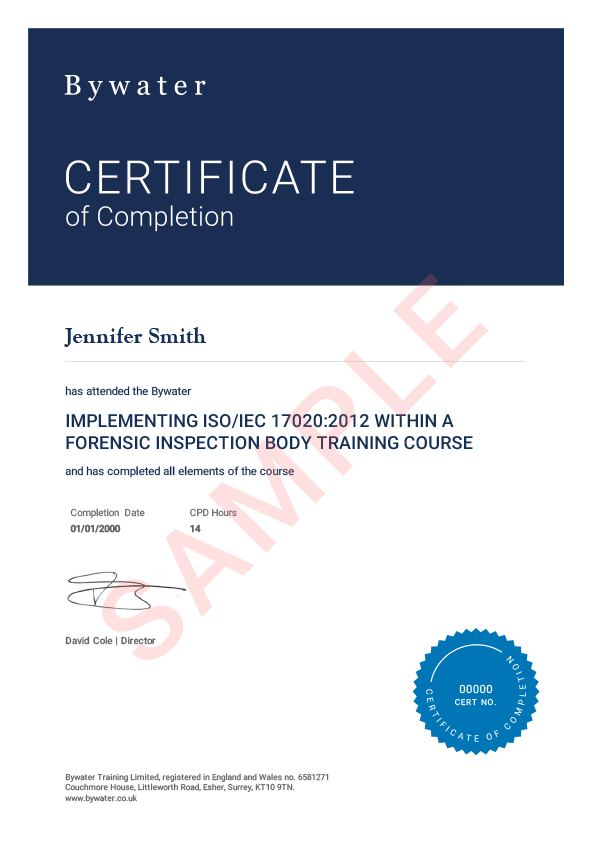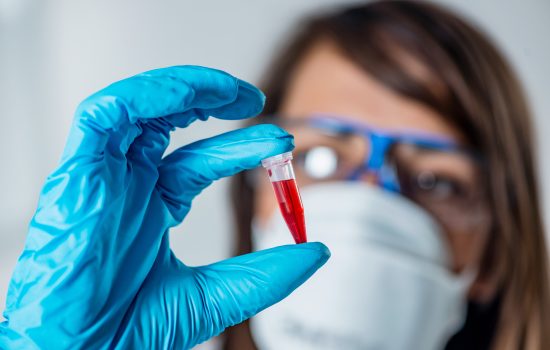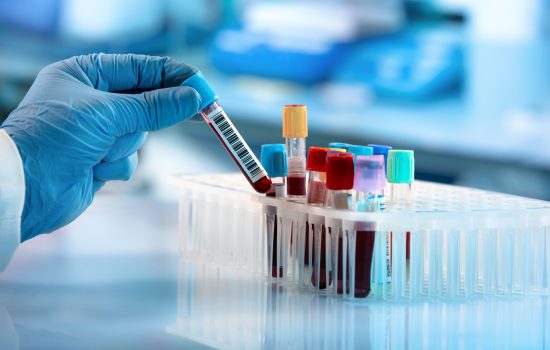ISO/IEC 17020 Implementation Training Course for Forensic Inspection Bodies
DURATION
2 daysCPD
Equivalent to 14 hoursCERTIFICATES
All delegates will receive a certificate on completion.DELIVERY OPTIONS
Through interactive workshops and engaging modules, the course focuses on ISO/IEC 17020 with specific reference to forensic applications inclusive of Forensic Science Regulator (FSR) guidance and International Laboratory Accreditation Cooperation (ILAC) guidance.
On the first day of this training course delegates will learn about the fundamentals of ISO/IEC 17020 and become familiar with the specific requirements of the standard in relation to a Forensic unit performing scene incident examinations.
On the second day delegates will explore IEC/ISO 17020 management system requirements and develop implementation skills, including performing a gap analysis, creating high level process maps, understanding risks and opportunities of implementation, and developing an implementation plan.
Click to read the ISO 17020 Implementation for Forensic Inspection Bodies course flyer.
- Forensic Units seeking ISO/IEC 17020 accreditation
- Those involved in implementing ISO/IEC 17020 within a Forensic Unit performing scene incident investigations
- Existing QMS consultants and auditors who are looking to expand their skills to understand and implement ISO/IEC 17020 in a forensic environment
- Those responsible for maintaining an ISO/IEC 17020 management system in a Forensic Unit
- ISO/IEC 17020 clauses and requirements including an overview of quality management
- Quality assurance
- The role of Inspection Bodies
- FSR Code of Practice/ILAC G19 and UKAS RG201 requirements
- Implementation
- Process Mapping
- Gap Analysis
- Creating an Implementation Plan
- Applying for UKAS Accreditation
- Day 1
- WELCOME AND INTRODUCTION
- Quality Management and Laboratory Accreditation
- ISO 17020:2012 Clause requirements covering Impartiality, Independence and Confidentiality
- Workshop: Impartiality
- ISO 17020:2012 Clause requirements covering Administration, Organisation and Management
- ISO 17020:2012 Clause requirements covering Personnel, Facilities, Equipment and Subcontracting
- Workshop: Examples of ISO 17020:2012 Clause requirements
- ISO 17020:2012 Clause requirements covering inspection processes
- ISO 17020:2012 Clause requirements covering the Management system used within the Forensic inspection body
- Workshop: Examples of ISO 17020:2012 Clause requirements
- Relationship between ISO/IEC 17020:2012, FSR Codes requirements, ILAC G19:08 requirements and UKAS RG201
- Review
- CLOSE
- Day 2
- What are you implementing?
- Workshop: Why are you implementing ISO/IEC 17020?
- How are you going to Implement an ISO/IEC 17020 QMS?
- What already exists within your Organisation?
- Workshop: Process Mapping
- What are the requirements of the ISO17020:2012 standard?
- Workshop: Identifying ISO17020:2012 requirements
- Gap analysis
- Workshop: Creating a gap analysis
- Implementation planning
- Workshop: Creating an implementation plan
- Next steps – applying for UKAS accreditation
- Review and feedback
- CLOSE
- Interpret the requirements of ISO/IEC 17020:2012 as it relates to management system standards
- Understand the FSR Code of Practice relevant to the scene incident activities undertaken by the Forensic Unit
- Understand the benefits of implementing ISO/IEC 17020
- Develop a plan for implementing ISO/IEC 17020
- Create a gap analysis
Delegates who fully participate in the course will receive a certificate of completion to demonstrate their new knowledge and skills in implementing ISO/IEC 17020:2012 within a Forensic Inspection Body.

In-company training availability
Receive this course exclusively for your organisation, either in-person at your chosen venue or online in our user-friendly Virtual Classroom.
Enjoy cost-effective flexibility and personalised learning with tailored messaging designed to address your unique business challenges.
| In-Person | |
|---|---|
| Delegate numbers | Up to 12 |
| Total fees | £4295 + VAT |
| Virtual Classroom | |
|---|---|
| Delegate numbers | Up to 10 |
| Total fees | £3995 + VAT |
What's included
- Delegate certificates of attendance.
- Comprehensive course materials and handouts.
- All tutor expenses and courier fees.
- Free cancellation up to 13 working days before commencement.
For courses held outside the UK or requiring significant adjustments, we will clearly inform you of any additional fees before you book.
Next steps
Find out our availability and enquire about this course by completing the form and our training team will get in touch with you.
Alternatively contact us on 0333 123 9001 or email contact@bywater.co.uk to discuss your requirements.
Enquire
Complete the following form to enquire about this course and our training team will be in touch.
Customer reviews
3t Global|16th Sep, 2025
Wood PLC|15th Aug, 2025
Sussex Police|14th Jul, 2025
Oceaneering International Services Limited|24th Jun, 2025
Premier Partnership|29th Apr, 2025
3T Training Services Ltd|28th Apr, 2025
Police, Fire & Crime Commissioner For Cumbria|21st Mar, 2025
Staffordshire Police|7th Feb, 2025
Animal and Plant Health Agency (APHA)|6th Feb, 2025
Inspection Consultants Ltd|29th Jan, 2025
West Yorkshire Police|6th Jan, 2025
3t Global|28th Nov, 2024


